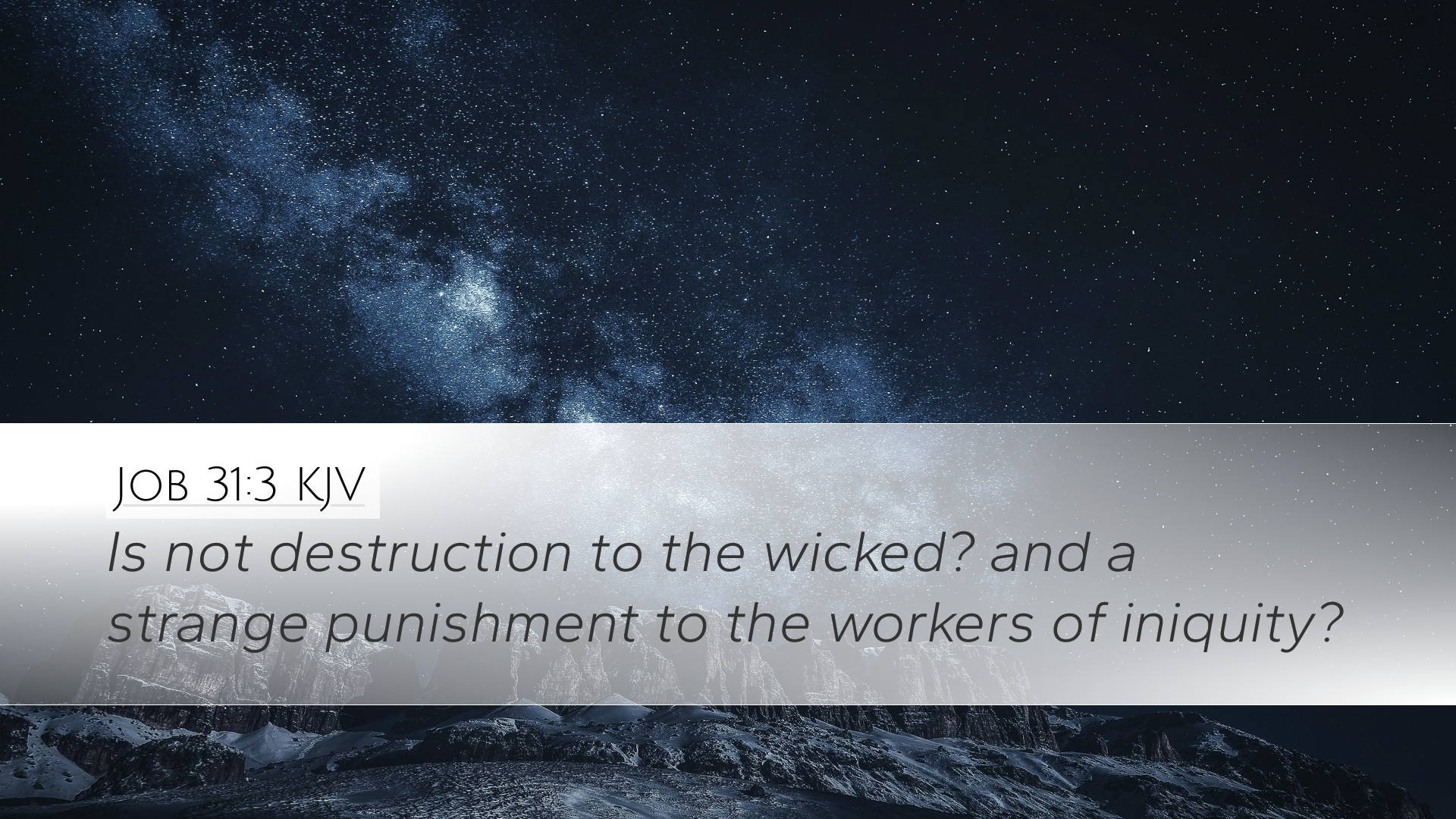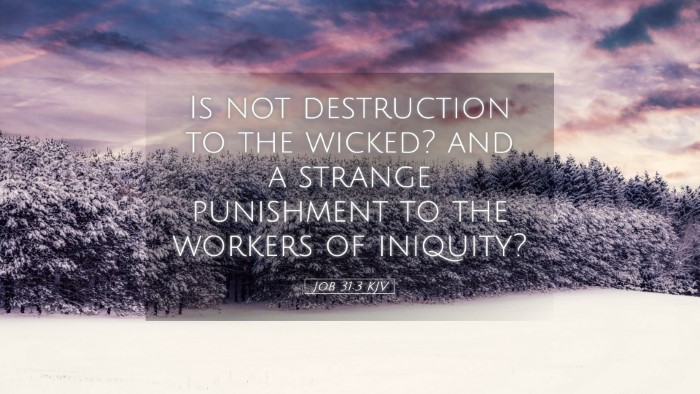Commentary on Job 31:3
Verse: "Is not destruction to the wicked and a strange punishment to the workers of iniquity?" (Job 31:3)
Contextual Overview
The Book of Job grapples with profound questions of suffering, justice, and the character of God. In chapter 31, Job asserts his integrity and outlines his moral conduct amidst his suffering. This particular verse highlights Job's awareness of divine justice and his understanding of the consequences faced by the wicked.
Insights from Historical Commentaries
Matthew Henry’s Commentary
Matthew Henry draws attention to the rhetorical nature of Job’s questions. He emphasizes that Job is not merely asserting his innocence but is also reflecting on the broader implications of justice. Henry points out that Job sees destruction and punishment as inherently linked with wickedness. He notes:
- Destruction as Judgment: Henry suggests that Job views destruction as a natural outcome for those who defy God’s commandments. He recognizes that a just God will not allow wickedness to go unpunished.
- Job’s Self-Defense: In questioning the justice of God in his own affliction, Job inadvertently invites reflection on the suffering of the innocent, calling into question the simplistic association of suffering with sin.
Albert Barnes’ Commentary
Albert Barnes provides a more analytical perspective, suggesting that Job’s inquiry presents an essential theological premise. He interprets the verse as follows:
- The Nature of Punishment: Barnes elaborates that the 'strange punishment' signifies a consequence that is unexpected, which serves to align with Job's experience of suffering despite his righteousness. The juxtaposition of the wicked's deserved punishment against Job's undeserved suffering raises critical questions about divine justice.
- The Moral Order: He argues that Job appeals to the moral order of the universe, asserting that if he has lived righteously, he expects reward rather than suffering. This principle of retributive justice is central to Job's plea, leading to a deeper exploration of the nature of God’s justice.
Adam Clarke’s Commentary
Adam Clarke, known for his exegetical insights, approaches the verse with a focus on the implications of Job's declaration:
- Questioning God’s Justice: Clarke suggests that Job's stance illustrates a profound theological dilemma regarding God's justice. He posits that Job could perceive God's silence as a contradiction to His just nature, questioning why the wicked often prosper while the innocent endure suffering.
- Divine Retribution: Clarke emphasizes the necessity of divine retribution, asserting that it serves to maintain the moral fabric of society and assure the faithful of God’s ultimate authority and justice.
Theological and Practical Implications
In light of these insights, several theological and practical implications emerge from Job 31:3:
1. The Nature of Divine Justice
This verse invites pastors and theologians to explore the complexities of God's justice. The presumption that suffering correlates with sin is challenged. This allows for a deeper discussion on the relationship between divine justice and human experience. It prompts a reconsideration of how one interprets suffering within a faithful life.
2. The Integrity of the Believer
Job's assertion of his integrity serves as a model for believers facing trials. It instructs them to maintain their moral and ethical commitments, even amidst suffering. Pastors could use this narrative to encourage congregants to uphold their faith and values despite apparent injustices in their lives.
3. The Role of Suffering
Job’s experience raises critical discourse on the role of suffering in the life of a believer. It can lead to discussions about the purpose of trials, spiritual growth, and the mystery of God’s plan. This encourages pastoral reflection on how to minister to those in distress without offering simplistic solutions.
4. Empathy towards the Suffering
Recognizing the struggles of the righteous in light of divine justice fosters a spirit of empathy among believers. It challenges them to support one another through trials, reflecting a community committed to upholding truth and righteousness.
Conclusion
Job 31:3 encapsulates the tension between righteousness and suffering, urging believers to engage deeply with the character of God. The insights from historical commentaries enrich understanding and invite personal reflection on integrity, justice, and the complex nature of human suffering before a sovereign God. As one meditates on this verse, it offers comfort and prompts theological inquiry, encouraging a robust faith that wrestles with the profound mysteries of existence.


